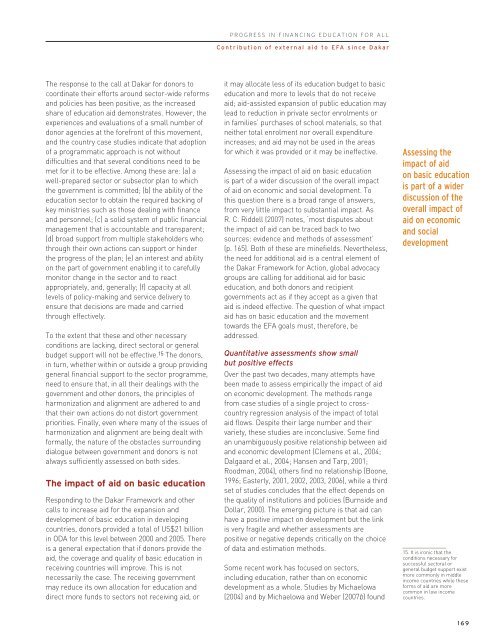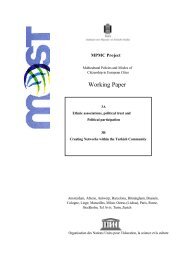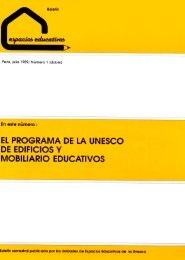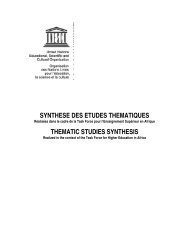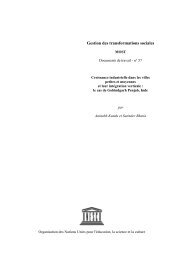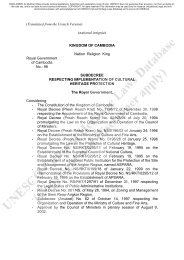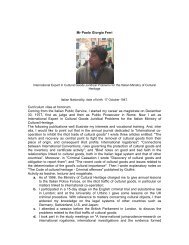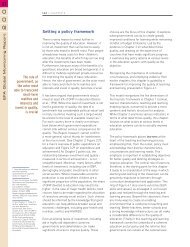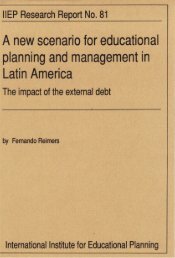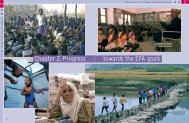Financing Education / pdf - Unesco
Financing Education / pdf - Unesco
Financing Education / pdf - Unesco
You also want an ePaper? Increase the reach of your titles
YUMPU automatically turns print PDFs into web optimized ePapers that Google loves.
PROGRESS IN FINANCING EDUCATION FOR ALL<br />
Contribution of external aid to EFA since Dakar<br />
The response to the call at Dakar for donors to<br />
coordinate their efforts around sector-wide reforms<br />
and policies has been positive, as the increased<br />
share of education aid demonstrates. However, the<br />
experiences and evaluations of a small number of<br />
donor agencies at the forefront of this movement,<br />
and the country case studies indicate that adoption<br />
of a programmatic approach is not without<br />
difficulties and that several conditions need to be<br />
met for it to be effective. Among these are: (a) a<br />
well-prepared sector or subsector plan to which<br />
the government is committed; (b) the ability of the<br />
education sector to obtain the required backing of<br />
key ministries such as those dealing with finance<br />
and personnel; (c) a solid system of public financial<br />
management that is accountable and transparent;<br />
(d) broad support from multiple stakeholders who<br />
through their own actions can support or hinder<br />
the progress of the plan; (e) an interest and ability<br />
on the part of government enabling it to carefully<br />
monitor change in the sector and to react<br />
appropriately, and, generally; (f) capacity at all<br />
levels of policy-making and service delivery to<br />
ensure that decisions are made and carried<br />
through effectively.<br />
To the extent that these and other necessary<br />
conditions are lacking, direct sectoral or general<br />
budget support will not be effective. 15 The donors,<br />
in turn, whether within or outside a group providing<br />
general financial support to the sector programme,<br />
need to ensure that, in all their dealings with the<br />
government and other donors, the principles of<br />
harmonization and alignment are adhered to and<br />
that their own actions do not distort government<br />
priorities. Finally, even where many of the issues of<br />
harmonization and alignment are being dealt with<br />
formally, the nature of the obstacles surrounding<br />
dialogue between government and donors is not<br />
always sufficiently assessed on both sides.<br />
The impact of aid on basic education<br />
Responding to the Dakar Framework and other<br />
calls to increase aid for the expansion and<br />
development of basic education in developing<br />
countries, donors provided a total of US$21 billion<br />
in ODA for this level between 2000 and 2005. There<br />
is a general expectation that if donors provide the<br />
aid, the coverage and quality of basic education in<br />
receiving countries will improve. This is not<br />
necessarily the case. The receiving government<br />
may reduce its own allocation for education and<br />
direct more funds to sectors not receiving aid, or<br />
it may allocate less of its education budget to basic<br />
education and more to levels that do not receive<br />
aid; aid-assisted expansion of public education may<br />
lead to reduction in private sector enrolments or<br />
in families’ purchases of school materials, so that<br />
neither total enrolment nor overall expenditure<br />
increases; and aid may not be used in the areas<br />
for which it was provided or it may be ineffective.<br />
Assessing the impact of aid on basic education<br />
is part of a wider discussion of the overall impact<br />
of aid on economic and social development. To<br />
this question there is a broad range of answers,<br />
from very little impact to substantial impact. As<br />
R. C. Riddell (2007) notes, ‘most disputes about<br />
the impact of aid can be traced back to two<br />
sources: evidence and methods of assessment’<br />
(p. 165). Both of these are minefields. Nevertheless,<br />
the need for additional aid is a central element of<br />
the Dakar Framework for Action, global advocacy<br />
groups are calling for additional aid for basic<br />
education, and both donors and recipient<br />
governments act as if they accept as a given that<br />
aid is indeed effective. The question of what impact<br />
aid has on basic education and the movement<br />
towards the EFA goals must, therefore, be<br />
addressed.<br />
Quantitative assessments show small<br />
but positive effects<br />
Over the past two decades, many attempts have<br />
been made to assess empirically the impact of aid<br />
on economic development. The methods range<br />
from case studies of a single project to crosscountry<br />
regression analysis of the impact of total<br />
aid flows. Despite their large number and their<br />
variety, these studies are inconclusive. Some find<br />
an unambiguously positive relationship between aid<br />
and economic development (Clemens et al., 2004;<br />
Dalgaard et al., 2004; Hansen and Tarp, 2001;<br />
Roodman, 2004), others find no relationship (Boone,<br />
1996; Easterly, 2001, 2002, 2003, 2006), while a third<br />
set of studies concludes that the effect depends on<br />
the quality of institutions and policies (Burnside and<br />
Dollar, 2000). The emerging picture is that aid can<br />
have a positive impact on development but the link<br />
is very fragile and whether assessments are<br />
positive or negative depends critically on the choice<br />
of data and estimation methods.<br />
Some recent work has focused on sectors,<br />
including education, rather than on economic<br />
development as a whole. Studies by Michaelowa<br />
(2004) and by Michaelowa and Weber (2007b) found<br />
Assessing the<br />
impact of aid<br />
on basic education<br />
is part of a wider<br />
discussion of the<br />
overall impact of<br />
aid on economic<br />
and social<br />
development<br />
15. It is ironic that the<br />
conditions necessary for<br />
successful sectoral or<br />
general budget support exist<br />
more commonly in middle<br />
income countries while these<br />
forms of aid are more<br />
common in low income<br />
countries.<br />
169


